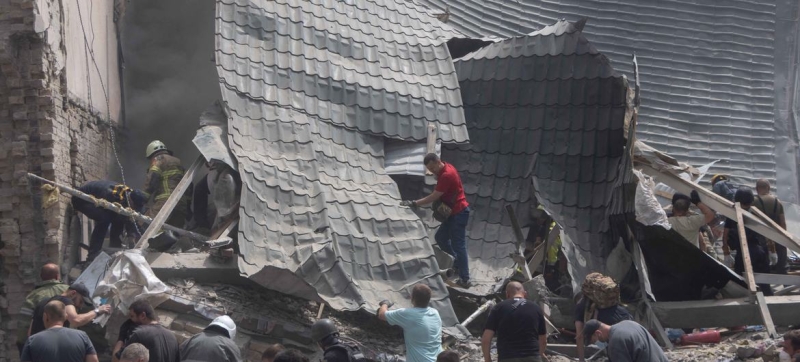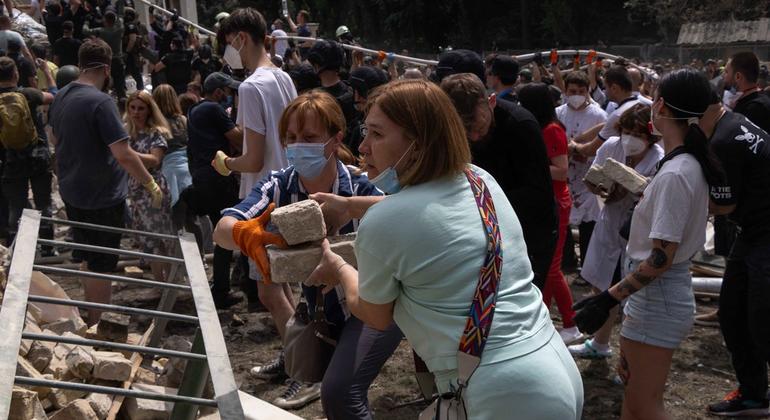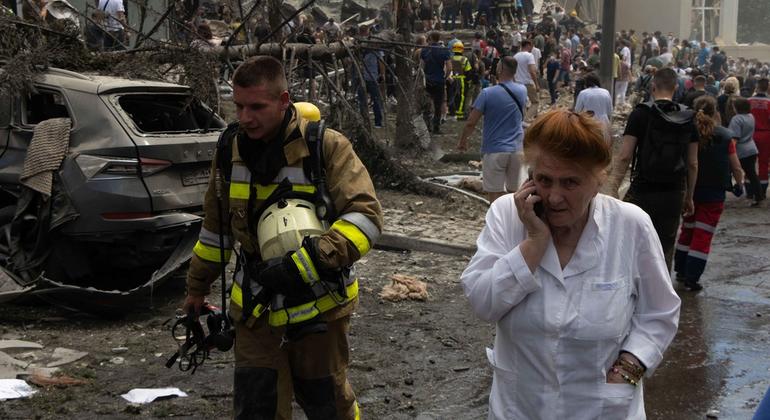
Consequences of a rocket attack on Kyiv. Hospital “Okhmatdyt”: report from Kyiv Anna Radomskaya Peace and Security
Monday morning in Kyiv began with alarm sirens, immediately followed by explosions. It seemed as if the city was being bombed from all sides – the roar was heard from everywhere, and at the same time the howl of ambulances and rescue vehicles. Many huge columns of smoke could be seen from different parts of the city.
Residential buildings, infrastructure and medical facilities were damaged as a result of the Russian missile attack. In total, according to the latest data from the State Emergency Situations Service, 22 people were killed and 74 injured in Kiev. Children’s Hospital of Ukraine, where more than 20 thousand children were treated annually. Children from all over Ukraine came here with various oncological diseases and complex congenital pathologies. For many of these patients, this was their only chance for recovery.
The building where there were children on hemodialysis (connected to an “artificial kidney” machine) was damaged by a missile strike. Oncology departments were destroyed. Doctors were forced to take children receiving chemotherapy out into the street under IV drips.
“The air raid alert started, we wanted to move the children to the basement and heard loud explosions. As soon as we approached the patients to somehow disconnect them from the equipment and take them outside, we heard even more explosions. “Everything started to fall on us, someone started screaming,” Maria, a nurse at the Okhmatdyt hospital, shares her experience. “Then we began to disconnect our patients from hemodialysis and transport them to a shelter through the window.” toxicology and other buildings were badly damaged. They have ten surgical departments, five oncological departments, intensive care and resuscitation departments, operating rooms, a radiology and radiation therapy department, as well as a laboratory for the only oncohematology department in the country. Now more than a hundred seriously ill children have been transferred to other hospitals in the city, and for Okhmatdyt itself the authorities are urgently looking for another premises.

Meanwhile, the rescue operation continues on the hospital grounds. Medical staff, as well as hundreds of caring Kiev residents, came to the aid of the State Emergency Service employees. At one point there were so many people that civilians were asked to temporarily refrain from traveling to Okhmatdyt. From all corners of the city, humanitarian aid was brought to the victims – water, food, hygiene products – they were provided with everything they needed.
UNICEF and WHO were among those who were the first to come to the rescue. The representative of the UN Children’s Fund UNICEF Munir Mamadzade and the Representative of the World Health Organization in Ukraine Jarno Habicht immediately arrived at the scene of the tragedy.
“We arrived here as soon as we heard the terrible news that a children’s hospital had been hit in an attack. Children with cancer undergoing treatment here were forced to hide in a shelter. We saw a lot of blood. We immediately delivered drinking water to the hospital and arranged for psychosocial support to be provided. We are waiting for further requests for assistance from the government of the country,” said UNICEF Representative in Ukraine Munir Mammadzadeh.
“Today, hundreds of children in Ukraine are suffering due to the war and its impact on the civilian population. As UN agencies – UNICEF and WHO – we are here to help. We helped this hospital with oxygen during the COVID-19 pandemic and with generators when there were power outages. We helped children with rehabilitation so that they could walk again. And now we need to start all over again,” added WHO Head Jarno Habicht.

A massive missile attack on Ukraine on July 8 fell not only on Kyiv, but also on other cities – Dnepr, Krivoy Rog, Slavyansk and Kramatorsk. The total number of deaths in Ukraine due to a Russian missile attack, according to the latest data from the State Emergency Service, is 33 people and 140 injured. These numbers are not final – the liquidation of the consequences of the shelling continues, and the number of victims is growing as rescuers clear the rubble.
Now UNICEF and WHO provide emergency assistance – provide water supplies and hygiene items. UN representatives are working with local authorities and partners to assess the needs of victims and stand ready to provide additional assistance.
